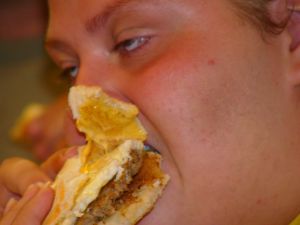A recent study in Spain (published in Public Health Nutrition) found that people who eat fast food are 51% more likely to be depressed than those who don’t consume fast food. The participants of the study had no depression diagnoses when the study began and were assessed for approximately six months. By the end of the study, after being fed a diet of fast food, over half of the people became depressed. And the more fast food consumed, the more likely the person was to become depressed.
 Now, before you put down that burger and fries and cry over that chocolate milkshake, take a moment. It’s more complicated.
Now, before you put down that burger and fries and cry over that chocolate milkshake, take a moment. It’s more complicated.
Those who consume a high amount of fast food increase the chance of depression because this type of eating causes poor health. But people who are depressed also reach for comfort junk food to feel better. So even though those in the study had no history of depression, there is still a relationship between people who feel depressed and their eating habits.
Other factors must also be considered when we are talking about the link between depression and fast food intake. For example, we know that people who are poor tend to eat more fast food, so poverty plays a role. And the subjects in the Spain study were less active, worked more than 40 hours a week and were more likely to be smokers–additional factors that can lead to problems. In other words, it takes more than a few fries and soda to put someone in a depressed state.
So while I advocate better eating for all, that juicy burger isn’t a depression risk if it is not part of your regular consumption. That said, you will improve your health by making healthier food choices, exercising, and putting an end to smoking!


